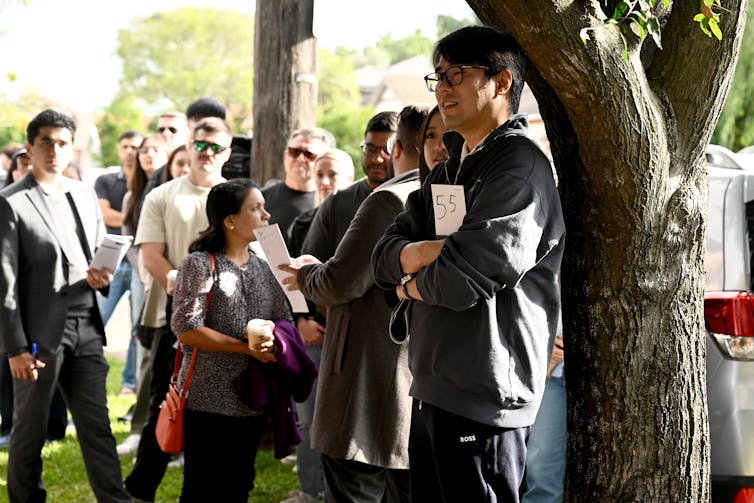Victoria will force home sellers to reveal their reserve price. Will other states follow?
- Written by Jian Liang, Senior Lecturer in Property Economics, Queensland University of Technology

If you’ve ever tried to buy a home at auction, you know how frustrating it can be to show up thinking you can afford a particular property, only for it to sell for far more than the advertised price.
Now, the Victorian government wants to make this experience a thing of the past. Under new laws[1] to be introduced into state parliament next year, real estate agents will have to publish a seller’s reserve price at least seven days before a property goes to auction.
Currently, Victorian auction rules[2] allow agents to provide a price guide, but do not mandate disclosure of the seller’s reserve price before the auction.
This gap can enable illegal underquoting[3], where properties are advertised below their expected sale price to attract more bidders.
The new law aims to close this loophole by requiring sellers and agents to disclose the genuine reserve price – the minimum amount the seller is willing to accept – at least seven days before the auction. It’s a step in the right direction for fairness and transparency, and a first for Australia.
So, what will the changes mean for home buyers, real estate agents and property prices? And could other states follow Victoria’s lead?
What is underquoting?
Underquoting occurs when an agent advertises a property at a price significantly below the seller’s reserve or market expectations. It is illegal under federal consumer law and subject to further state-specific legislation[4].
However, enforcement has been challenging[5], in part because reserve prices don’t have to be made public. Sellers currently don’t even have to disclose a reserve price to their agents before auction day.
Behavioural economics helps explain why underquoting fuels emotional bidding at auctions. Buyers anchor their expectations to low advertised prices, even when unrealistic, and loss aversion[6] drives them to bid aggressively to avoid missing out.
Herd behaviour[7] can amplify this dynamic as large crowds at an auction signal high demand, often leading to the “winner’s curse[8]” – paying more than a property’s intrinsic value.
Why go to auction in the first place?
Auctions are a popular way to sell property in Australia. They’re most common[9] in Victoria, New South Wales and the Australian Capital Territory.
One driver of this popularity is they create competitive tension, often resulting in higher sale prices[10], especially during a booming market. They also provide certainty of sale on a fixed date (if the reserve price is met) and allow transparent bidding in real time.
For buyers, the flip side is this competitive environment can amplify psychological biases, leading to emotional bidding[11] and driving up prices.

Less uncertainty, but more ambitious reserves
Victoria’s move to mandate reserve price disclosure is likely to have a range of impacts.
When it comes to auction behaviour, the requirement may reduce uncertainty and temper emotional bidding. Buyers will have clearer signals about affordability, potentially curbing any unrealistic expectations.
However, this transparency could also anchor buyer expectations higher if it leads to sellers setting more ambitious reserves, sustaining competitive pressure.
What about house prices?
While the reform improves transparency, its impact on overall price levels is likely to be limited. Structural drivers – such as supply constraints, population growth and interest rates – will continue to dominate price trends.
Auctions may become more rational, but prices in high-demand areas may remain high.
Real estate agents will need to adjust their marketing strategies. Underquoting as a tactic to attract large crowds will no longer be viable. Compliance costs may rise, and agents could face penalties for failing to disclose genuine reserves.
Will the rest of the nation follow?
There is no clear indication yet that any other states plan to adopt Victoria’s model. NSW is tightening penalties[13] for underquoting, but its approach remains focused on accurate price guides rather than reserve price disclosure.
Queensland is unlikely to follow, as its policy philosophy favours banning price guides altogether[14] rather than adding new disclosure rules.
Overall, Victoria’s move represents a significant step towards improving fairness. But on its own, it is unlikely to solve broader housing affordability challenges driven by structural market forces.
References
- ^ new laws (www.premier.vic.gov.au)
- ^ Victorian auction rules (www.consumer.vic.gov.au)
- ^ underquoting (www.consumer.vic.gov.au)
- ^ state-specific legislation (www.consumer.vic.gov.au)
- ^ enforcement has been challenging (www.abc.net.au)
- ^ loss aversion (theconversation.com)
- ^ Herd behaviour (doi.org)
- ^ winner’s curse (theconversation.com)
- ^ most common (www.abc.net.au)
- ^ higher sale prices (doi.org)
- ^ emotional bidding (doi.org)
- ^ Dan Himbrechts/AAP (photos.aap.com.au)
- ^ tightening penalties (www.nsw.gov.au)
- ^ banning price guides altogether (www.qld.gov.au)

















